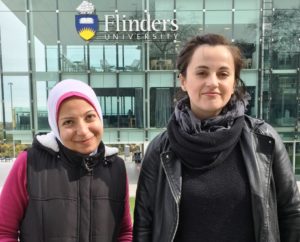
Two new Flinders University PhD candidates, from Egypt and Croatia, are bringing a truly international dimension to one of Australia’s premier underwater archaeology programs.
Omaima Eldeeb, who holds a Masters Degree from the Alexandria University, and Katarina Jerbić, who holds a Masters from the University of Zagreb, will respectively study shipwrecks and amphorae (ancient Greek or Roman jugs) sites along the Alexandrian coastline, and a 6,000-year-old prehistoric site off the North Adriatic Coast.
Ms Eldeeb, who spent four years working as an underwater archaeological inspector in Egypt’s Central Department of Underwater Antiquities, will undertake a maritime archaeological survey project at one of the shipwreck and amphorae sites along Alexandrian Coastline, through GIS mapping, excavation, dendrochronology, radiocarbon dates and 3D modelling, in addition to proposing a way to protect the site while promoting public access.
“Amphora studies may prove to be the best means of studying the country’s ancient past, especially in terms of its economy and its connectivity with other regions of the Mediterranean and beyond,” she said.
Ms Jerbić, meanwhile, will study the ancient Zambratija settlement, which is now three metres under water. The prehistoric pile dwelling (stilt houses or palafittes) is the only settlement of its kind discovered in the Adriatic region.
“Due to the melting of glaciers that was occurring at that time, and later on, Zambratija was flooded by rising sea levels,” Ms Jerbić said. “So far more than 120 piles have been found on the site.
“In my research I will try to reconstruct the settlement by marking all of the piles and trying to find patterns. If I find them, it will be possible to make 3D reconstructions of the houses and of any other kinds of buildings.”
The Flinders PhD candidates’ work has been made possible by scholarships from the Honor Frost Foundation (HFF), which was founded in 2011 in memory of its namesake, Honor Frost, one of the pioneers or marine and maritime archaeology.
The foundation’s mission is to promote the advancement and research, including publication, of maritime archaeology with particular but not exclusive focus on the Eastern Mediterranean, with an emphasis on Lebanon, Syria and Cyprus.
Ms Eldeeb said it was a dream come true to be studying at Flinders and that she planned to take every opportunity to expand her skills and experience as an underwater archaeologist.
“I’m planning to take a Geographical Information Systems (GIS) course so I can create a GIS archaeological map for sites, and to take a sailing course which will help me to understand more about how sails work and how they were used in ancient times,” she said.
“I’m also planning on improving my diving skills and want to qualify as a divemaster by the end of this year.”
Ms Jerbić, who has ten years’ previous experience as an archaeologist, said it was an honour to be studying at one of Australia’s top institutions for underwater archaeology.
“My scientific interest has always been towards European prehistory and its diversity, especially on the territory of my home country and the Adriatic Coast,” she said.
“I have always been attracted to the concepts of cultural boundaries and how they overlap each other in all the dimensions of human perception – time, space, language, and thought. I think my research will give me more understanding of some of those boundaries and how they can, paradoxically, show us how connected we truly are.
“Flinders University is the perfect environment in which to do this because of its international diversity and overall acceptance of new knowledge.”
Both HFF-supported PhD candidates, who are among a cohort of seven new Flinders PhDs this year, said they had been humbled by the support from the Honor Frost Foundation and were proud to be part of her legacy.
Read more about the Honor Frost Foundation here and about Maritime Archaeology at Flinders University here.
Flinders is the current Chair of the UNESCO UNITWIN Network for Underwater Archaeology. Read more about the network here.

